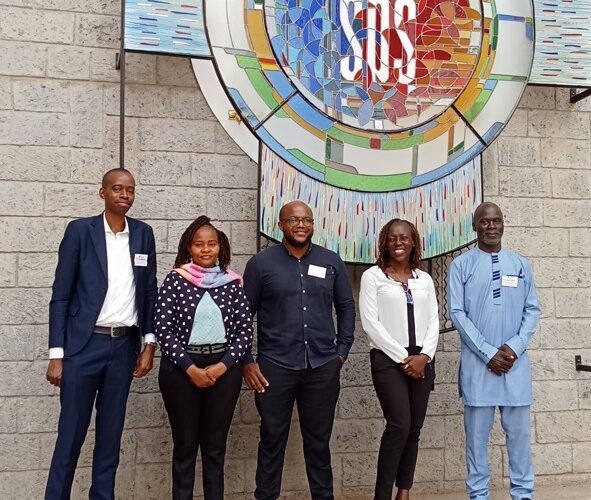PADRA members presented papers at the SSRC Sponsored Panel at the Amplifying African Voices for Strategic Action (AFSA) Conference held on 31st October – Ist November 2024, at Strathmore University, Kenya organized by The African Centre for the Study of the United States (ACSUS) based at the University of the Witwatersrand, South Africa.
The SSRC’s African Peacebuilding Network (APN) and Next Generation for Social Sciences in Africa (Next Gen) sponsored a panel made up of members of the Peace and Development Researchers Association (PADRA) of Kenya, on ”Global Powers, Regional Organizations and Peace, Security and Development in the Horn of Africa, at the Amplifying African Voices for Stretegic Action (AFSA) conference, Nairobi. Four papers were presented in this panel. Dr Kizito Sabala from the University of Nairobi spoke on The Notion of African Solutions to African Problems and External Interests: Exploring the Missing Link in Africas Peace and Security Agenda in the Horn. His presentation made a case for the African Union (AU) to take on its rightful role in peace and security as mandated by its founding documents. The paper further evaluated the role of external players in influencing the outcomes of conflict resolution and political settlements and identified funding as a major challenge facing peacebuilding efforts. Based on the case of the Horn, the presenter captured the implications of the AU’s failure to implement the notion of ’African Solutions to African Problems’ such as the inability to limit the influence of external actors on Africa’s peace and security agenda in a significant way and ii) leverage the agency of African regional organizations in promoting peace and security.
Dr Marion Ouma, a Research Associate at the University of South Africa spoke on ; Social Policy in Africa: Examining the Pathway to Peace and Social Cohesion. Her paper explored the interrelatedness between the causes and drivers of conflict such as poverty, scarcity and the erosion of social wellbeing and cohesiveness. Her argument in the paper was that social policy is one laudable intervention that can increase societal cohesion in contexts where poverty and vulnerability subsist. The paper noted that transformative social policy could contribute to enhancing and sustaining peace and development at multiple scales. She also remarked that most of the continent‘s international organizations often take lead in shaping and framing social policy frameworks thereby usurping Africa’s agency. The paper appraised the African Union Social Policy Framework (AU-SPF) and related frameworks such as Agenda 2063, the African Union Protocol on Social Protection and Social Security, and their potential for creating a transformative social policy relevant to peace and security on the continent. The paper concluded that the implementation of the AU-SPF and related policy frameworks while adopting an African agency perspective would improve the social contract and ultimately lead to the promotion of nation building and social cohesion.
In his paper on; The East African Community Regional Force (EACRF) intervention in eastern DRC: actors and implications for regional integration and stability, Dr Nicodemus Minde, from the Institute for Security Studies, Nairobi, relied on the Regional Security Complex Theory (RSCT) in assessing the impacts of the East African Community Regional Force (EACRF), and its short-lived intervention in the eastern Democratic Republic of Congo. The paper discussed the evolution of processes that led to EACRF deployment and its related mandate of addressing increased violence by armed groups in the eastern DRC. The paper assessed the actors in the peace process and evaluated the EACRF performance amid the complexities of actors’ interests in the eastern DRC region. The paper assessed that while the EACRF has made strides in stabilizing certain areas and facilitating non-violent transfers of territory, its effectiveness had been constrained by ambiguous mandates, coordination challenges, and competing national interests. The paper concluded that regional integration and addressing the root causes of conflict through inclusive governance and economic development would be crucial for achieving lasting stability in eastern DRC even as EACRF was replaced by the The Southern African Development Community (SADC) Mission in the Democratic Republic of Congo( SAMIDRC).
Dr John Mwangi from the Mashariki Research and Policy Centre, Kenya spoke on; Building Peace in South Sudan: An Assessment of the IGAD’S Contributions and Challenges. This paper acknowledged the role of the Intergovernmental Authority on Development (IGAD) in various phases of the peacebuilding process in South Sudan. The paper appraised IGAD’S contributions and challenges that the sub-regional body continued to face in on-going peace processes, particularly in South Sudan. It in a diagnosis of the state of the play in South Sudan by highlighting statebuilding challenges including poor governance and elites’ power contestation. Additionally, the paper offered a series of suggestions on how to overcome the current peace impasse with lessons for IGAD and the country.
The presentations were followed by robust discussions, questions and interactions between the paper presenters and participants, around issues linked to African agency in relation to conflict prevention, peacebuilding, and development. There was also a lot of interest in the degree of agency of Africa institutions as the main drivers (as opposed to international actors) in driving policies linked to peace, security and development in the Horn of Africa/East Africa. The conference also provided an excellent space to network with potentials for research and policy work collaboration.
By John Mwangi

